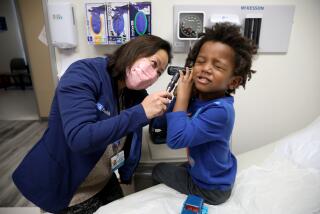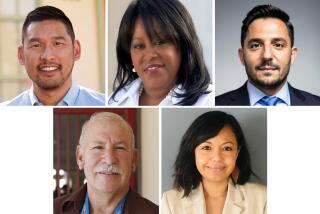Parents Support School-Based Clinics, Survey Shows
- Share via
In the first community-based test for school-based health clinics, more than 93% of parents in the Mid-City area anchored by Hoover High School who responded to a survey favor the health clinic idea, according to results released Thursday.
Support for a health and social services center for all area public school students--from kindergarten through 12th grade--was strong across all the ethnic and language groups represented in the Hoover neighborhood, the results show.
Armed with the favorable results, a special Hoover committee of parents, teachers and administrators which undertook the survey voted Thursday to ask the San Diego city schools Board of Education on May 16 for approval in concept to set up a health center based at Hoover. Two board members--Ann Armstrong and Susan Davis--attended Thursday’s meeting and trustee Shirley Weber is thought to be leaning in support of school-based clinics.
Would Seek Funding
If a majority of the five-member board of trustees agrees, the committee would then seek funding from private foundations to operate the clinic. Several sources said Thursday that at least two national foundations involved in adolescent health care already have indicated informally that they would be willing to financially support a Hoover clinic.
Hoover parent Felix Villegas, a community aide who makes home visits to students not attending class, put the statistics into personal terms Thursday.
“I visited the home of one kid who has a (chronic) illness, but whose mother is on drugs . . . and the kid wants to kill himself,” Villegas said of the unsettled home life. “This clinic could really help” with its counseling and medical aid “and I know that if there is this one kid, there’s a lot more needing help out there.”
Approximately 16%, or 1,323 of 8,000 parents, responded to the one-page survey sent out late last month to parents at seven elementary schools, at Wilson Middle School and at Hoover. The survey was phrased in non-technical language and was translated into Spanish and several Indochinese languages, reflecting the socioeconomic diversity of Mid-City, where half the school-age population has no regular health care, according to an earlier student survey done by the Hoover committee.
Tabulations were done with the help of San Diego State University political scientist C. Richard Hofstetter under the university’s partnership arrangement with Hoover. Hofstetter said Thursday that the 16% response was an accurate indication of the feelings of all those Hoover-area parents who have an opinion about the controversial issue.
There was no significant difference in support between the 30% of those responding who were aware of the idea--which has been under way since January--and the 70% who had heard little or nothing of the plan. Almost 82% of those familiar with the idea said a clinic was a good idea, while 95% of those just learning about the idea supported it.
Parental majorities in the 90% range at both the elementary and secondary levels approved proposed services for counseling on job opportunities; police-related problems and drug and alcohol problems; medical care for illnesses and injuries; physical exams, immunizations and medications; referrals for specialized medical and dental care.
In the two most controversial areas of services, more than 80% of parents at the secondary level approved the idea of counseling for family problems and providing information about pregnancy and sexual problems. Two-thirds of parents at both Hoover and Wilson approved the idea of providing contraceptives to their children.
The detailed questions about sexual counseling and contraceptives at the secondary level were asked because opponents of school-based clinics have consistently argued nationwide, as well as locally, that such centers are merely family planning centers masquerading as comprehensive health facilities.
There were no abortion-related questions because such a clinic would neither handle abortions nor make abortion referrals, Hoover committee members have emphasized.
Catholic Diocese Opposes
Opponents, who include the hierarchy of the Roman Catholic diocese in San Diego, already have indicated they will oppose any school-based clinic proposal, in large part because of the family-planning issues. Father Douglas Regin, the respect life director of the diocese, said in the church’s Southern Cross newspaper this month that Catholics should write letters to the school board in opposition.
While detailed operational plans for any clinic remain to be formulated, Hoover committee members reiterated Thursday that parents would need to indicate the range of services they wish their children to have. Opponents have charged that state law allows students access to birth-control and other sexual-related issues with or without the permission of parents.
School district attorney Melanie Petersen said Thursday that in cases of abortion referrals, the state Attorney General’s office has opined, on the basis of court cases, that minors are allowed access to such clinics without parental approval. However, abortion-related services are not at issue with the Hoover proposal, Petersen said, and she added that, in general, the district could establish its own rules requiring parental assent for all care at a clinic on a school campus.
“But we will obviously want to research this definitively based on the specific functions a school-based clinic would offer,” Petersen said.
A proposal initiated three years ago by schools Supt. Tom Payzant for school-based clinics as a districtwide policy was turned down, 3 to 2, by a prior board of trustees after a bitter battle that anti-abortion opponents turned into a debate over the morality of providing family-planning counseling for teen-agers.
But in the past year, both the Hoover committee and a multi-agency task force of city and county social service officials known as New Beginnings have been looking into ways to improve student health and counseling care by coordinating services better. Payzant has said he would support a clinic plan if it was generated from a specific school community area.
A random scientific poll taken for the school district last fall shows strong support for such clinics from 66% to 76% of those surveyed, depending on whether funding was public or private.
The Hoover survey was not scientific in that residents were not selected on a statistically-random basis because of cost, since such interviews can cost as much as $20 each.
But Hofstetter of San Diego State said Thursday that “among people who were interested enough in the issue one way or another to respond, the distribution of opinion represented in the survey is accurate . . . we have here a scientific representation among the group who did respond.”
More to Read
Sign up for Essential California
The most important California stories and recommendations in your inbox every morning.
You may occasionally receive promotional content from the Los Angeles Times.













